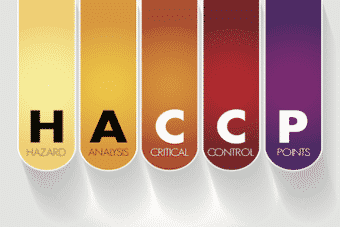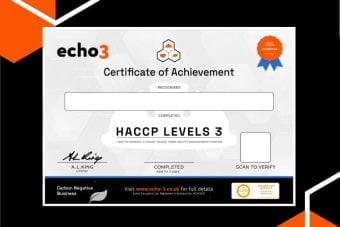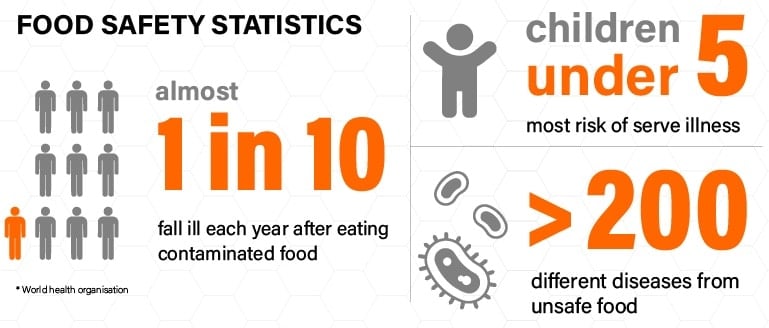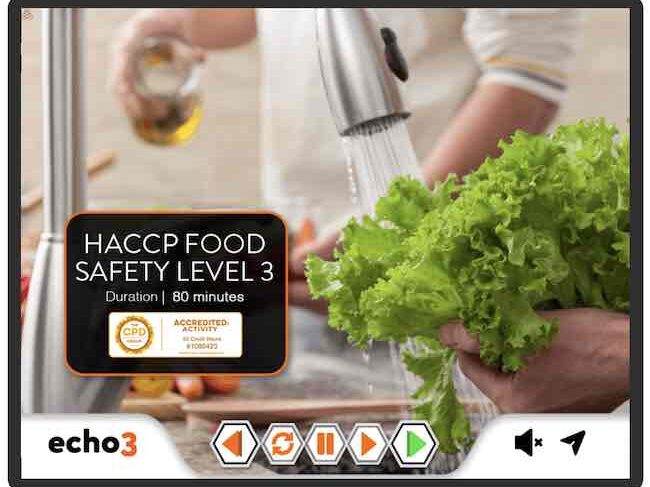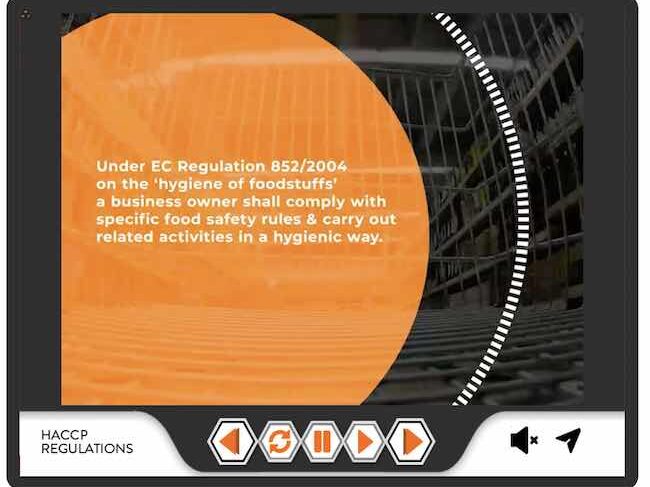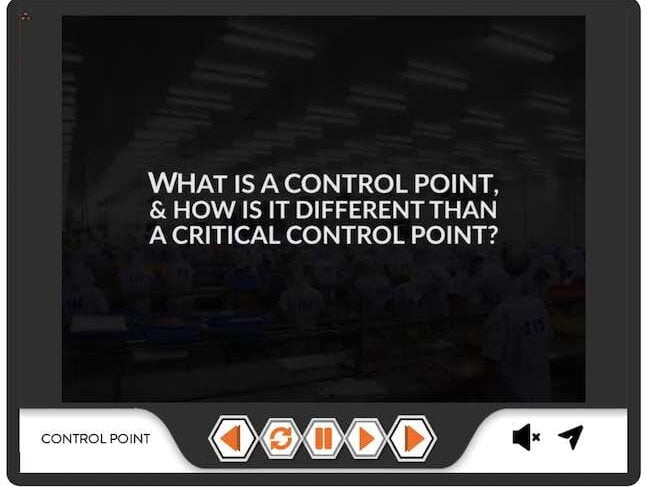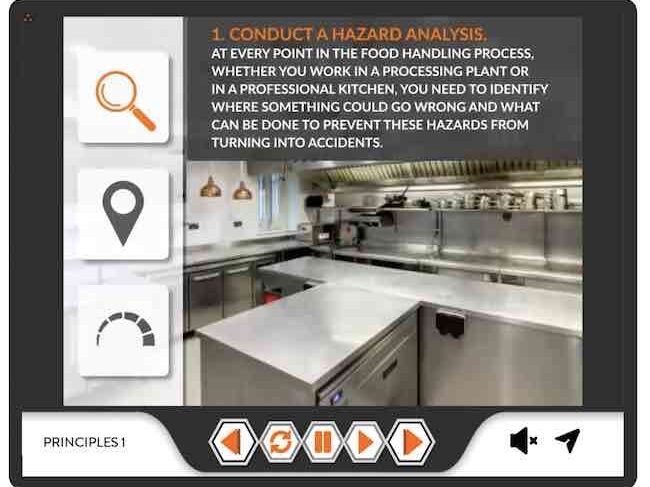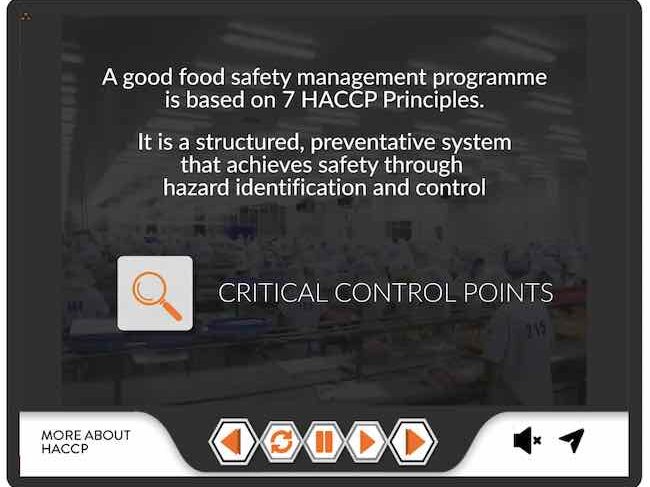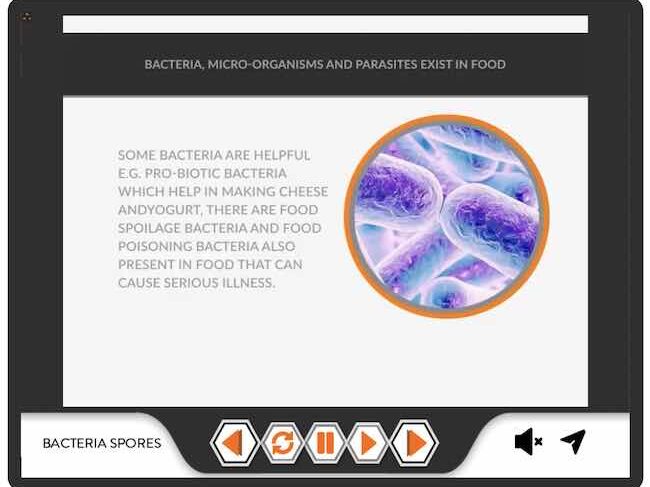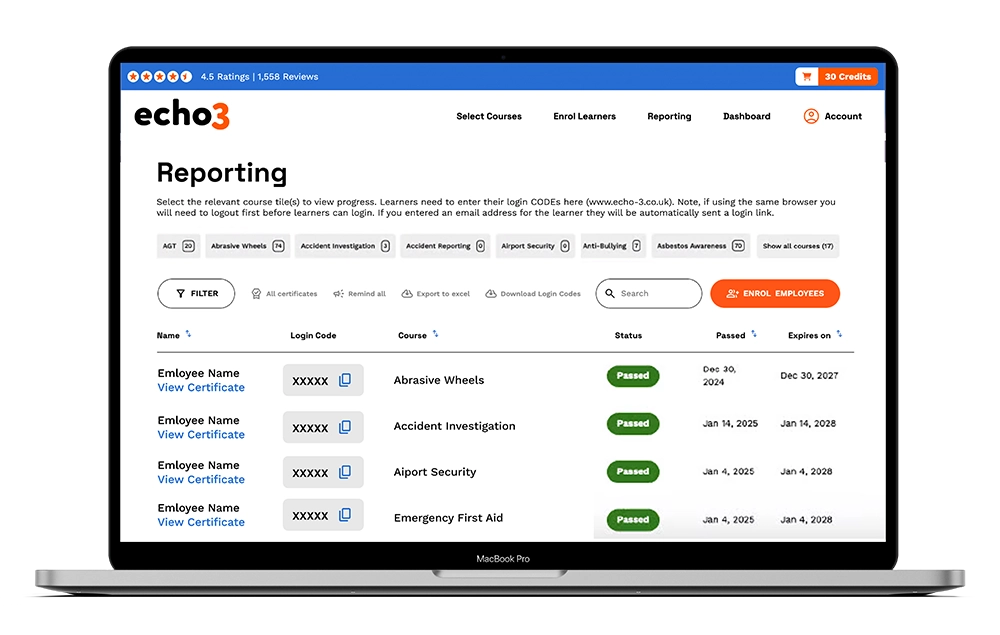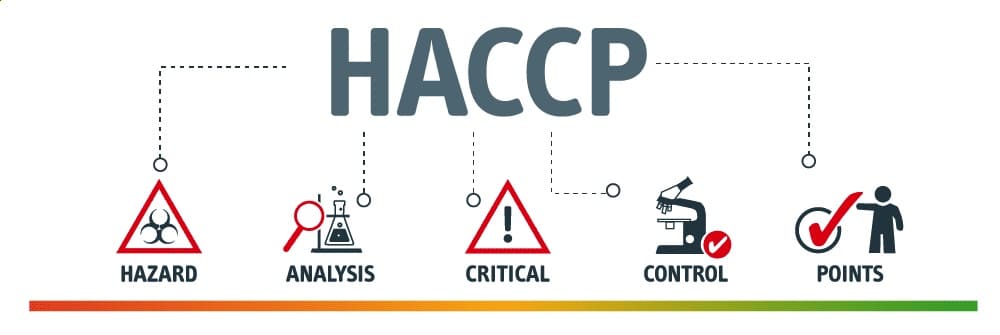HACCP Level 3 Course
This online HACCP Level 3 course has been designed for all managers and supervisors.
HACCP stands for Hazard analysis and critical control points. HACCP is a systematic approach to identifying and controlling hazards that could pose a danger to the preparation of safe food.
The aim of this training is to provide information on how to maintain high food safety standards with an effective HACCP system that works for your business.
In this course, we look at food safety awareness, food contamination, prevention measures, and the role of HACCP in ensuring that food related accidents are avoided.
Across Europe, there are an estimated 45.4 million cases of food poisoning each year. Many of these could have been prevented if HACCP principles had been implemented and followed correctly.
Food poisoning as result of poor work practices in your business can have disastrous consequences for people and businesses alike.
Under EC Regulation 852/2004 (which was also retained in UK law after Brexit) there must be an organised and effective Food Safety Management System (FSMS) in place which is suitable for the business to ensure the food produced or sold is safe. A good food safety management programme is based on seven HACCP Principles.
Whether you manage in a restaurant, delicatessen counter, or small food outlet, you are, so far is as reasonably practicable, responsible for the health of your employees, and the public.
HACCP Level 3 Course Content
UNIT 1 | INTRODUCTION
In this first learning unit, we explain why it is vital staff understand that dangers that are present while preparing food. Then we explain what HACCP is and its role in ensuring food safety.
UNIT 2 | HACCP LEGISLATION
In our second learning unit, we focus on the key food safety legislation. This includes, for example, the legal requirements for staff to receive training in HACCP to ensure your staff understand their obligations to your business and your customers. The learning unit then explains the important role played by enforcement authorities, including their regulatory powers.
UNIT 3 | THE 7 HACCP PRINCIPLES
The third learning unit centres on each of the seven (7) principles of HACCP. We learn each of the principles and how they combine to provide a preventative approach to food safety. The learning unit also looks at some specific processes that form key parts of HACCP.
UNIT 4 | FOOD HAZARDS
In our fourth learning unit, we examine the various sources of food hazard. This ensures your staff understand the potential hazards to your customers, and their role in effectively controlling risks.
UNIT 5 | HACCP PREREQUISITES
In learning unit five, we detail and explore the 10 environmental conditions that must exist in order for HACCP to work.
UNIT 6 | CONTROL MEASURES
In our final learning unit, we look at the control measures that will help keep your customers safe. The learning unit covers issues such as: Colour coding; Preventing cross-contamination; Temperature control; Handling and storage; Auditing; Product recall; Policies; Complaint handling.
UNIT 7 | QUIZ
HACCP Level 3 Course Certificate
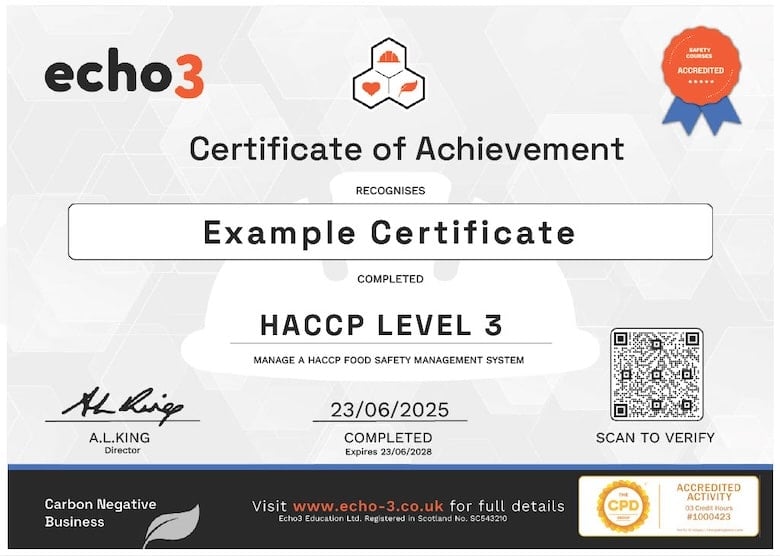
Download and Print Your Certificate
- Written in compliance with Regulation (EC) No 852/2004
- Developed by qualified health and safety professionals Accredited by CPD – learn more about CPD here
- Last Updated January 2024
- To gain the certificate you must complete the assessment which involves 20 questions.
- You can access our LMS any time to reprint certificates, check and set pass marks and act as proof of a commitment to ongoing legal compliance.
- The online HACCP Level 3 certificate is valid for 3 years.
How to use the Echo3 Platform
Individual Learners

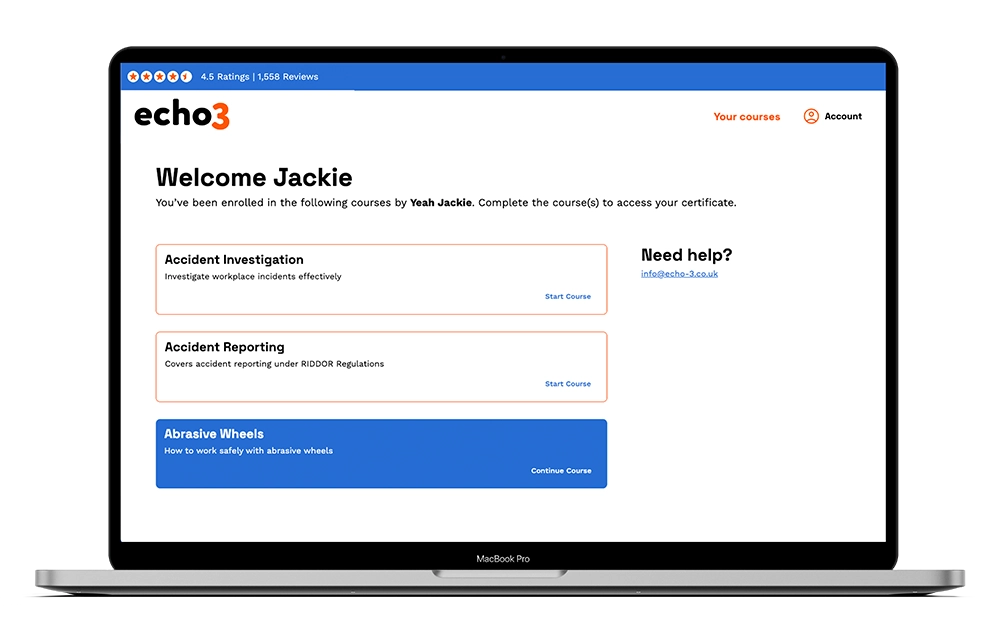
Benefits for Individuals
-
Engaging video-based content
-
Learner dashboard included
-
Instant access after payment
-
Free course retakes
-
Shareable digital certificate
 QR Code Certificate
QR Code Certificate



Bulk Buying Discounts
10 Courses
50 Courses
100+ Courses
Course Preview
Echo3 courses include engaging motion-graphic video content, with full english subtitles
What the the Level 3 HACCP course objectives?
The objectives of the Echo3 online HACCP Level 3 course are
- Provide participants with a clear understanding of Hazard Analysis and Critical Control Points (HACCP) principles and their practical application in food safety management.
- Show participants how to conduct thorough risk assessments to identify potential food safety hazards and assess their severity and likelihood.
- Enable learners to create and implement HACCP plans tailored to specific food production processes, including the establishment of critical control points (CCPs) and monitoring procedures.
- Ensure participants are well-versed in food safety regulations helping them maintain compliance.
- Train participants to conduct HACCP audits to continually assess the effectiveness of HACCP plans and ensuring ongoing compliance.
- Foster a mindset of continuous improvement in food safety practices, encouraging learners to stay updated with emerging trends and technologies.
Who should take this level 3 course?
The HACCP (‘Hazard Analysis and Critical Control Point’) regulation aim to reduce risks arising from biological, chemical and other hazards that can affect food produce and cause serious harm.
With the UK Food Standards Agency estimating that there are 2.4 million UK cases of food-borne illness each year, all food businesses have a moral and – importantly – a legal duty to actively maintain high food safety standards in their area of work.
Employers operating a food-related business in the UK, or elsewhere in the EU, are required to have in place a HACCP-based food safety management system; this is an essential criterion to meet legal responsibilities. To comply with regulations, employees must receive appropriate training on HACCP.
Online HACCP Level 3 training suited for a range of professionals including.
- Food Safety Managers and Supervisors: Those overseeing food safety practices should take HACCP Level 3 training. It equips them with the knowledge needed to implement and manage robust food safety systems.
- Food Industry Executives: CEOs, managers, and executives in the food industry should understanding HACCP principles to make informed decisions regarding food safety and quality management.
- Individuals Seeking Career Advancement: Anyone looking to advance their career in the food industry can benefit from HACCP Level 3 training.
What are the learning outcomes?
On completion of the HACCP Level 3 course learners will:
- Know food safety regulations and duties
- Understand the various ways food can become a hazard to customers
- Know principles of food safety and the role of HACCP to control hazards.
- Know how to raise standards of food hygiene in your workplace.
- Encourage your staff to demonstrate safe food practices.
- Manage a compliant Food Safety Management System.
What is HACCP?
HACCP is a food safety management system that stands for stands for ‘Hazard Analysis and Critical Control Points’.
HACCP was first developed for NASA in the 1960s to ensure food safety during the first space flights.
Hazard Analysis and Critical Control Point (HACCP) is a systematic approach to identifying and controlling hazards (microbiological, chemical or physical) that could pose a danger to the preparation of safe food.
HACCP is recognised internationally as a logical tool for adapting traditional inspection methods to a modern, science-based, food safety system. Based on risk-assessment, HACCP guides both government and industry in safe food production practices.
HACCP ensures safety during production, delivery, preparation, service and consumption of food. In practical terms, this means operating a safe kitchen, canteen, deli, or food preparation area that will not cause harm to co-workers or the public and protect them against poisoning.
What are the benefits of HACCP?
Poor work practices can have disastrous consequences for individuals and for businesses.
Whether you are working in a restaurant, delicatessen counter, or small food outlet, you are legally responsible, so far is as reasonably practicable, for your health, the health of your co-workers, your employees, and of the public.
A HACCP system, properly implemented, will assure you that everything is being done to keep customers and your business safe.
HACCP benefits are neatly summarised with the acronym:
S.A.F.E.F.O.O.D.
- Saves money in the long run
- Avoids poisoning customers
- Food quality increases
- Ensures compliance (*EC No.852/2004)
- Food safety increases
- Organises processes to produce safe food
- Organises employees, promoting efficiency and teamwork
- Due diligence defence in court
What are the HACCP regulations?
EU Regulations 852/2004 requires business owners to comply with specific food safety rules & carry out related activities in a hygienic way. An effective food safety management system must be in place based which is suitable for the business to ensure the food produced or sold is safe.
A good food safety management programme is based on seven HACCP Principles. A structured, preventative system that achieves safety through hazard identification and control.
*NOTE: The same duties were retained in UK law after BREXIT through amendment to the General Food Regulations 2004 and the Food Safety Act 1990.
What are the 7 principles of HACCP?
The 7 principles of HACCP are?
- Hazard Analysis
- Critical Control Points
- Establishing Critical Limits
- Monitoring Requirements
- Corrective Actions
- Procedures
- Verification
Related Courses
HACCP Levels 1&2 – Provides an introduction for staff to the importance of HACCP and the 7 HACCP principles. With this knowledge staff can help ensure only safe food is served.
Food Hygiene Level 2 – Provides staff with the knowledge needed to adopt safe food handling and hygiene practices.
Food Hygiene Level 3 – Provides managers & supervisors with the knowledge needed to ensure safe food handling and hygiene practices are always observed.
Food Allergies – Provides staff and managers with the knowledge needed to properly manage allergens.
Preventing Cross-Contamination – Provides the knowledge needed to prevent the cross-contamination of bacteria including E.coli in food businesses.






